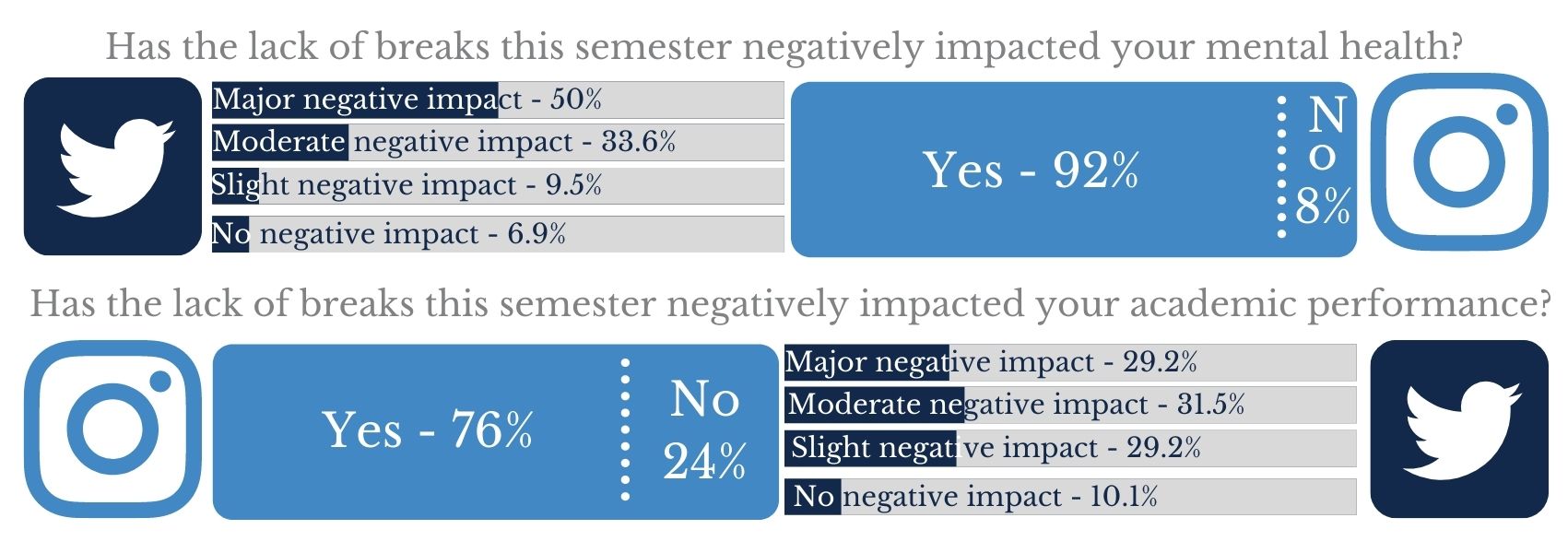Many students are struggling with the lack of mid-semester breaks this year. Graphics by Hannah Hoeke.
ALISON MICCOLIS | STAFF REPORTER | amiccolis@butler.edu
The COVID-19 pandemic has brought numerous changes to the typical college experience, and the academic calendar is no exception. In an email sent on Sept. 18, Provost Kathryn Morris provided students with the modified spring 2021 academic calendar.
Similar to the fall semester, all breaks have been removed to minimize the number of times students leave campus and come back. The resultant spring semester starts on Jan. 25, with exams ending on May 4.
Brooke Kandel-Cisco, dean of the college of education, was part of a workgroup responsible for exploring different calendar models, and ultimately making a recommendation to the Provost and Executive Council, who made the final decision. The workgroup consisted of a faculty representative from each of the colleges, as well as representation from student affairs, athletics and other groups on campus.
“We were trying to navigate the ever-changing information connected, of course, to the pandemic and its impact on our students in particular, but our community in general,” Kandel-Cisco said.
Kandel-Cisco said the workgroup looked at models from other institutions and discussed different options they could move forward with. She said their goal was to meet a lot of competing interests for students, such as their academic, social-emotional, mental and physical needs.
Junior biology major Noelle Grabowski said she has noticed a difference in the balance between academic and social commitments with the modified academic calendar this fall. She said it is harder to stay ahead of your workload or catch up if you are falling behind in a class.
“I feel like at least my friends, from what I’ve seen, spend a lot more time on the weekends doing work and trying to catch up on stuff,” Grabowski said. “Whereas maybe, you know, we’d be doing something or hanging out, they are definitely spending more time, especially on the weekends, trying to catch up on work and things like that.”
Other colleges and universities across the country are also taking a condensed semester approach for the spring. Some of these schools removed spring break from the calendar but added single break days throughout the semester. For example, Purdue added three “reading days” and Marquette added four “mental health days.”
Kandel-Cisco said the workgroup considered the possibility of adding single days off throughout the semester. However, after looking at the benefits and challenges, they could not find a solution that was inclusive of students in all majors.
One challenge of including mid-week, individual days off is a lack of balance and continuity of instructional time across days, Kandel-Cisco said. For example, if a course consists of both lecture and laboratory time, losing a day in the middle of the week could cause a professor to eliminate certain labs or instructions for a given course. Several individual days off would mean multiple weeks of disrupted schedules, Kandel-Cisco explained.
“Ultimately, as we looked across the university and all of the different programs, course offerings and approaches to instruction, there just wasn’t a way to make it consistent and equitable for students and not have it create significant challenges in other places, like physical safety or health safety,” Kandel-Cisco said.
Riley Keller, a sophomore music performance major, said that while it is very different than last year, he does not mind having the semester condensed and all breaks removed.
“Having a week-long break is really nice in the middle of the semester, but I don’t think I mind having it kind of all at once,” Keller said. “I do think this semester we needed some kind of break somewhere in there. I know last year, we had what they called fall break. I feel like we could have had that, but obviously, a lot of teachers are trying to fit the curriculum into a set amount of time.”
Since the fall semester is ending earlier and the spring semester is starting later, traditional winter break is longer than in years past.
Kandel-Cisco said the workgroup took this into consideration and hopes that it is an opportunity for students to relax and recharge.
“We also talked about the fact that while the fall semester is intense because there are no breaks and similar to the spring semester, we also hope that those two months that students will have between fall and spring semester will really give them an opportunity to, as much as possible, relax and take a break, and try to really refresh themselves and be renewed for the spring semester,” Kandel-Cisco said.
Junior psychology major Kathryn Aldstadt said she understands why the decision to remove breaks was made and that her professors are trying to modify their curriculum to accommodate for the stress many students are feeling.
“I mean, it’s tough, but we’re also in the middle of a pandemic so it’s tough for everyone,” Aldstadt said. “You know, it’s kind of our only option, and you’ve got to deal with it. Life has changed dramatically, and it sucks, but there’s really no way around this situation that we’re in.”



